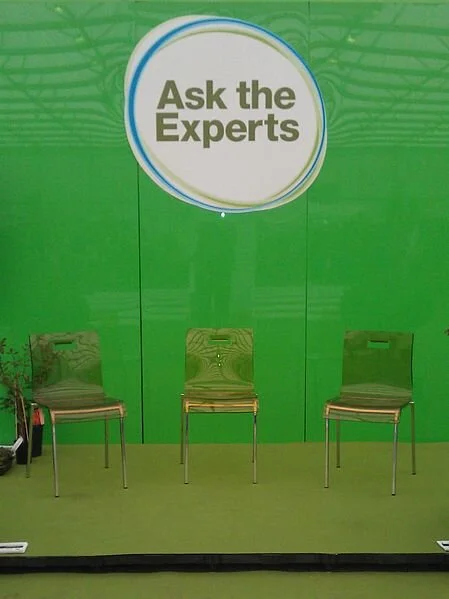Image by Andy Mabbett on wikimedia commons.
One of the distinguishing features of deliberative processes (e.g. Citizens' Juries, Citizens' Assemblies and other similar dialogue processes where the participants are 'mini publics') is the use of 'experts'. Who chooses them? What role do they play? If you haven't had enough of experts, read on...
Deliberative democracy processes bring together members of the public, recruited (rather than self-selecting) using methods aims to ensure a demographic spread equivalent to the population they are a sample of. Often this includes a lottery stage (or 'sortition') and sometimes the process deliberately seeks to exclude people with too close a knowledge of the question being debated (e.g. the Greater Cambridge Citizens' Assembly excluded "elected representatives from any level of government, local authority staff working on transport, environment or planning, paid employees of any political party, or staff or board members of organisations actively campaigning on transport, environment or planning issues.")
This is all intended to make the group of citizens as close as possible to 'ordinary' people.
Having assembled a group who are intentionally not 'experts' (although of course they bring all sorts of expertise with them), how are they expected, putting it bluntly, to know what they are talking about?
Three kinds of experts
Expert witnesses - provide objective or balanced information about the topics under discussion, without expressing a particular point of view. Often academics, public servants or consultants.
Advocates - arguing for or against a course of action or a solution to the problem. May be from businesses which provide solutions, or from campaign organisations.
Experts by experience - members of the public who have a particular kind of life experience which is relevant to the topic. They may be active in support groups or in their community, or perhaps part of a patient group or service user group.
The experts can contribute through written materials, video clips, live presentations and - importantly - by answering the group's questions.
Who chooses the experts?
There are a few ways in which experts can find themselves involved.
They may be invited by the organisers, often advised by a multi-stakeholder advisory group. The involvement of a multi-stakeholder group helps ensure the experts are credible to all sides, the advocates represent a breadth of opinion, and the right kind of experience is brought in via the experts by experience.
The group of citizens might request that particular kinds of expertise are made available to them. Sometimes this becomes clear because the questions being asked by the group can't be answered by the experts who are already involved. It can be a headache for the organisers to find additional experts in time for the group to hear from them, but it's a great way to pass more ownership of the process to the group. And if the group is interested in aspects of the topic that the organisers haven't anticipated, efforts should be made to respond to that interest.
People might offer (or request) to provide expertise. Particularly if the initiative has become well-publicised, stakeholders may offer to present to the group. Sometimes this offer can be more like a demand! The organisers - with their multi-stakeholder advisors - will need to consider whether the offers will help provide a more rounded picture of the problem and its possible solutions, or whether the input may be a red herring or skew things too much in a particular direction.
On tap, not on top
Experts need to remember that their role is to be 'on tap, not on top'. Having provided their input, they should speak only when spoken to! If they are an expert witness, they should refrain from giving an opinion about particular solutions. Advocates should remind people they are arguing for a particular solution, not giving neutral input.
MAKING THE PATH BY WALKING
This post was first published in my free (monthly-ish) newsletter. Scroll right down to subscribe.

